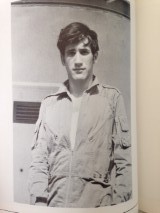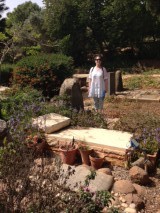The Pilot by Carol Narod
The Pilot
by Carol Narod
If you were a teenager in a Jewish youth movement in 1975, chances were good that 
following high school you would spend a gap year in Israel. Accordingly, I left Vancouver to
enrol in the Machon program, The Institute for Youth Group Leaders from Abroad.
The first six months of the program involved intense studies in Jerusalem. The other half of
the year I was stationed on Kibbutz Ma’ayan Baruch in the far north, not far from where
Trumpeldor fell.
On kibbutz I was housed with the international volunteers, sharing a squat block of yellow
rooms. Unlike my colleagues in Jerusalem classrooms, these volunteers didn’t engage in hours
of heated political and religious how-many-sides-of-the-Jordan debate. Rather, they were on
extended work holidays. They’d complete their shifts in the orchards by early afternoon, then loll
in the sun leafing through fashion magazines, smoking, strumming guitars to Leonard Cohen
tunes, or looking for a little lovin’. It was a quiet life, far from the madding crowd, save for the
occasional gunfire we heard across the border from the civil war in Lebanon.
One holiday morning, early spring, I stepped off my stoop and onto the green. My
roommates were painting their toe nails for the Purim party that night. Among the kibbutz elders
it was debated whether nail polish was in accordance with the socialist labour Zionist policies of
the kibbutz, but no matter. The mood was Mardi Gras meets Halloween meets New Year’s Eve,
and nail polish would play its part. The two ‘It Girls” there, Imogene and Anju. They may have
been milking cows here on kibbutz, but we all knew back in bonny England they had ridden
pedigreed ponies and luncheoned at “the club”. Imogene had sleek blond hair. Anju was long
and thin and brown as a yard stick.
There was much anticipation and speculation. Who would wear what? Who would dance
with whom? Which soldiers would show up on leave? Gabriella, from Italy, mentioned
someone called Guy Golan.
“Who’s Guy Golan?” I asked.
“You don’t know? Jordana, the Australian, asked. “He’s like, the number-one pilot of the
Israeli airforce. How could you not know?”
“Molto bello.”
“And he’s Leib’s son”
“Wow,” I said, “does he bake apples too?”
“Give him apples, he’ll bake em.”
“Good luck with that,” Jordana told me. “He’s out of our league. Besides, he’s old. He’s
like, twenty-two.”
“So what? He’s still hot.”
Bets were wagered. Either Imogene or Anju would entice the aging pilot tonight.
Guy Golan was a mythological creature in those parts: An ace pilot. The country had
invested millions in him. He was granted the use of a car, a kibbutz rarity, to facilitate his trips
between his base and Ma’ayan Baruch. He was the oldest son of the kibbutz director. His
parents had been early pioneers of the young Israel. His father had emigrated from South
Africa, whose Zionist movements had inspired some of the most ardent Zionists in the world.
His mother was from a prominent founding family. They had helped drain the marshes of the
Huleh Valley, planted citrus trees, tilled the soil. They adopted their new family name from the
Golan hills. They named their son Guy, after the valley. His English was as strong as his
Hebrew. On kibbutz we were all equal. But Guy Golan was more equal than others. Prince
Farming.
We spent the day baking date and fig hamentashen, plucking chickens, and evading the
groping hands of the cook. We decked the old dining hall in streamers and balloons. Set out
bottles of sparkling grapefruit cider, beer, and Arak, the middle eastern liqueur which tasted of
licorice. The musicians arranged their instruments: Accordion, drums, and fiddles. Noisemaking
graggers for the children.
Rummaging in the communal “give-what-you-can-take-what-you-need” box, I found enough
accessories for a gypsy costume. I subdued my ungovernable hair with a green chiffon scarf,
added purple plastic earrings, necklaces galore of beads and shells, carnation red lipstick, and
gobs of black eyeliner. High classy.
The hall sparkled with party lights. Tables were covered by coloured cloths. The musicians
were playing Sephardic melodies while the crowd improvised belly dances. The wine flowed. A
Levantine bacchanalia. Imogene and Anju slunk in like two Siamese cats, Imo in a sequined
bustier and russet harem pants, slit up the sides, Anju in a turquoise and gold sari which
showcased her diminutive waist. Queens Esther and Vashti. I watched from a bench, feeling
like a pudding. Then a young pirate, tall and slim, lowered himself in front of me, proffering a
tray.
“A drink, Beauty?”
Beauty? What am I ? Bathsheba Everdene? I’d been warned about these soldiers, how they
tried to seduce the volunteers (Please to sleep with me, I can be dying tomorrow…) I wouldn’t
fall for it. Nevertheless, I accepted his drink.
“What is it?”
“Whisky 777. Israel’s finest.” I tasted it and scrunched up my face. “You’re supposed to
down it all at once. You can do it.” I did. The lanky pirate moved on with his tray to the other
girls on the bench. Jordana approached me, posthaste.
“Do you know who that was!? That’s Guy Golan!”
“Oh, he’s not THAT handsome.”
She thwacked me with her gragger.
The musicians started the Israeli mazurka. The Golan creature was back. Standing before
me, holding out his long fingers, inviting me to dance.
“It’s easy to follow,” he assured me, but was surprised and pleased to discover I already
knew it. Or being tipsy, my muscles remembered it. Hold hands, turn out, spin under, hop.
Israeli couple dances can be painfully romantic. Ani le dodi le dodi li. I to my beloved, my
beloved to me. Eyes demure, faces incarnadined, feet bare. Working up a sweat. Guy stayed
with me through the set of Israeli dances, and then onto a Viennese waltz. The Blue Danube.
Ta da da da da. Da da, da da … Spinning and spinning and spinning and the coloured lights
blurring and Guy Golan smiling at me from way up there and we were in what the Celts call a
thin place where there’s a very thin separation between Earth and Heaven.
Except I was getting so dizzy I thought I was gonna puke. Guy recommended we step
outside for some fesh air. We stood on the green and looked up at the stars and the moon
which shone like a flashlight through the kibbutz soft air. The new lilacs were pungent. I felt a
tentative hand on my back. It was kinda romantic, ’til Imogene arrived and, ignoring me,
dragged Guy onto the dance floor. Rock n’ roll now. The Eagles. A Horse with no Name “. I
danced with the the kibbutz children while Guy took turns dancing with the girl soldiers and
international volunteers.
Around two in the morning the party was still going strong, but the kids were outlasting me. I
gathered my shoes and shawl and started back to my room.
“Wait up!” Guy was running to catch up with me. “Can I walk you?” He laughed as I stumbled
down the slope, weaving through the modernate art sculptures. At my door, he didn’t try to
come in. Instead he asked, ” May I kiss you goodnight?” (Who does that?)
I consented. “But make it good.”
“The pressure is on.” He was so tall he almost bent himself in half and gave me a peck. He
straightened up . “I have a better idea.” He grabbed a grimy plastic stool and hoisted me on to it
so our faces were at the same level.
“Is this what they call The Golan height?” Our whisky kisses relaxed and warmed, ’till he
stopped, and said,
“I’d better say goodnight.”
Wuh? Did I say cease and desist?
The next day was a regular work day. In the dining hall the flourescent lights were back on.
We were once again in our blue work shorts and hardy kibbutz sandals. I cradled my coffee cup
on the white formica table.
“Can I join you?” Guy stood with his breakfast tray, then sat down across from me. Without
the help of alcohol and the magic of the moon, he seemed almost timid, and his shyness rubbed
off on me. Our conversation was awkward. As he sliced his cucumbers and tomatoes, he told
me he was due back at his base. “I’ll be back in a few weeks. Will I see you then?”
“I’ll see you then.”
Lehitraot.
I had a lump in my throat as I watched the soldiers head across the green, their rifles slung
over their soldiers. The keepers of Israel shall neither slumber nor sleep. My kibbutz mother
placed her arm around me.
“Dont worry. You’ll get used to it”. Her own son was heading out in khaki uniform.
Back then we had no email or facebook or tweets or skype or avatars to help us along. The
kibbutzniks shared one temperamental telephone. Letters took forever. A few weeks was a long
time for a callow youth on a gap year.
I didn’t stay. I was lured to another kibbutz by some poetic French boys.
A few years later, I was visiting a friend in Toronto. We played Jewish geography. Her
boyfriend had recently spent time on Ma’ayan Baruch.
“Oh, did you know Guy Golan?” I asked.
He stared at me. “Guy Golan is in Heaven.”
Guy Golan died in an airplane crash in 1979.
———-
It is now 2015. I was recently vacationing in an RV park. The central green, communal wash
house, and scrubby gravel paths reminded me of the kibbutz. A small plane flew overhead. I
thought of Guy Golan. Wait! We have Google now! We can look up anything! So I googled Guy
Golan, Kibbutz Ma’ayan Baruch. There were only a couple of sentences in English. I asked my
Israeli cousin to send me a link from a Hebrew site. It provided a hazy computerized translation,
but I understood the gist of it. F16’s. Mature. Wise. Uncompromising. A natural leader. Well
loved. Destined for greatness. Everything that Israeli parents could wish their son to be.
He had been seeking a wife, someone who knew the songs of the land. At the time of the
accident he had recently returned from the United States. He had parted ways with his
American girlfriend because, after all, how could he wed someone who didn’t know the songs of
Ha’Aretz? Four days after his return, he was tired, jet lagged, upset. It was a foggy night. He
shouldn’t have been flying that night. Why didn’t he eject?
I studied the black and white photo of a skinny pilot in a flight suit. Half of his face showed
inordinate determination. The other half, a shy young man.
I marvelled at the strength of character he must have had to get up in the sky and break the
sound barrier, defend his young country. Compete with every other Israeli young man to get
where he was.
Hard to fathom, he’s been lying underground all these years. Almost forty of them.
These days, to honour Guy, the Ma’ayan Baruch children play in a hollowed out shell of a jet
plane.
Israel has so many stories of missed opportunities. What if….what if….
The years learn things that the days don’t know.





